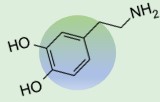Dopamine is a neurotransmitter and hormone vital for many functions, including movement, motivation, and the sensation of pleasure. It's a chemical messenger that helps nerve cells communicate, influencing both the brain and body.
What Dopamine Does
Reward System: Dopamine plays a significant role in the brain's reward system. It is released during pleasurable experiences, reinforcing behaviors and motivating repetition.
Movement and Coordination: Dopamine impacts movement and coordination. Low dopamine levels in certain brain areas can cause conditions like Parkinson's disease.
Cognitive Functions: Dopamine enhances focus, attention, and concentration, contributing to executive functioning. It supports working memory, planning, productivity, and mental alertness for task completion.
Other Functions: Dopamine is involved in kidney function, lactation, sleep, memory, stress response, mood, attention, digestion, pain processing, heart rate, blood vessel function, and control of nausea and vomiting.
Dopamine as a Hormone
Dopamine acts as a hormone when released into the bloodstream. It is a catecholamine that plays a small role in the "fight-or-flight" response.
Dopamine is released by the hypothalamus and influences various body functions.
Clinical Significance
Mental Health Disorders: Dopamine imbalances are associated with mental illnesses such as depression and schizophrenia.
Neurological Disorders: Dopamine deficiency is linked to motor impairments, as seen in Parkinson's disease.
Medical Uses: Dopamine is used to treat low blood pressure, slow heart rate, and cardiac arrest.
Addiction: Dopamine is involved in addiction. The good feeling that dopamine provides after pleasant experiences can also happen after drinking alcohol and using illegal drugs.
Therapeutic Applications: Dopamine is used as a vasostimulant to treat low blood pressure, low heart rate, and cardiac arrest.


